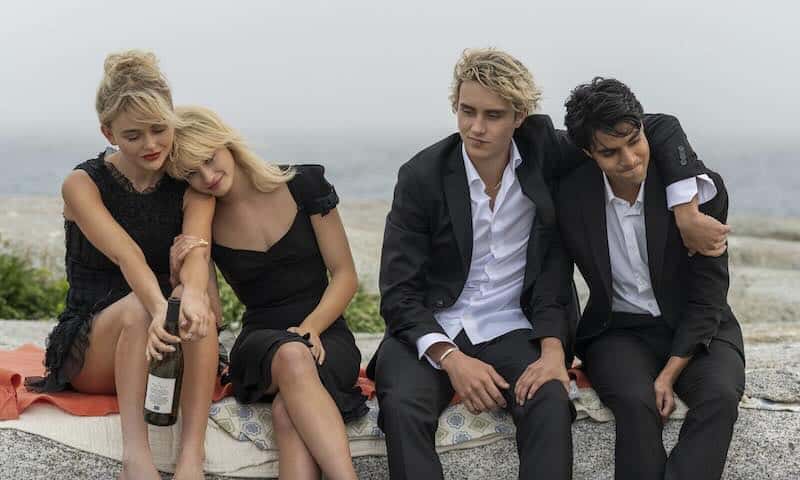We Were Liars was a slow burn for me. The first episode was mindnumbingly ordinary. But this coming of age story based on a novel by E. Lockhart grows more and more complex, mysterious, and fascinating with each episode as it leads you carefully to a wow of an ending full of surprises.
We Were Liars takes the point of view of Cadence (Emily Alyn Lind). She was the oldest grandchild in the wealthy Sinclair family. She spent the summers with her grandparents, parents, aunts, cousins, and friends on their private island. Each family group had their own huge house filled with expensive objects.
The story begins in summer 7, when Cadence was 7 years old. That summer her Aunt Carrie (Mamie Gummer) and Carrie’s live-in fella Ed (Rahul Kohli) brought Ed’s nephew to the island for the summer. Gat (Shubham Maheshwari) was the nephew.
The story ends in summer 17, when Cadence is 17 years old. She spends the summer trying to unravel the mystery of what happened to her a year ago in summer 16 when she suffered a trauma.

Things changed a lot in summer 16. Cadence and Gat fell in love and the cousins started drinking a lot. The foursome of Cadence, Gat, Mirren (Esther McGregor), and Johnny (Joseph Zada) called themselves “the liars.” Gat was considered part of the family by the liars.
Harris (David Morse) was the wealthy patriarch. Everyone devoted every minute of every day to trying to please him and make him proud. Well, the three sisters who were the parents of the liars did. Penny (Caitlin FitzGerald), Carrie, and Bess (Candice King) were the mothers of the liars.
There was also a group of younger cousins who were referred to as “the littles.” This big family seemed perfect from the outside. But the three sisters were absolute horrors. They argued constantly over who got what in the inheritance, they all were secretly broke because of their “unsuitable” husbands. Everyone had secrets and no one talked about anything to anyone. Money covered all their sins.
Harris was a tyrant, a right wing white supremacist who hated Ed and Gat. Johnny was gay and couldn’t tell his parents or grandfather, although the liars knew it.
Gat was the outsider. He visited India with his mother and came back full of ideas about privilege and purpose that made sense to the liars. They began to think about what it meant to squander their privilege, and what kind of rules had to be followed to maintain the facade of perfection so important to the family image. While the four teens were having the normal coming of age experiences with sex and drinking, they were also becoming more and more aware of the system of tyranny and oppression that existed under their grandfather. It was a combination of those things that led to the danger, excitement, and shocking revelations in the last couple of episodes.
The series was interesting from a political subtext point of view. While seemingly about teens and their romances and various young adult issues, it was also telling a wider story. There were mental health aspects to the story, especially with Cadence as she worked to reconstruct a missing year of her life. There were references to drug addiction, fidelity, honesty, equality, and racism. A major theme of the story was about ways of dealing with grief. Interesting to me was that no matter how badly these teens wanted to burn down the patriarchy, the message that violence was not the solution was loud and clear.
Although I started the series thinking it was a big fail, I ended up admiring the careful construction and slow reveals of the shockers in the series.
The series was filmed in Canada. Some Canadian favorites there in smaller roles included Dylan Bruce, Wendy Crewson as Cadence’s grandmother, Tim Rozon, Andrew Moodie, and Dempsey Bryk. I loved the fact that all the directors were women: Erica Dunton, So Yong Kim, Tara Miele, Julie Plec, and Nzingha Stewart.
We Were Liars is streaming on Prime Video. The entire series is available now.

Leave a Reply